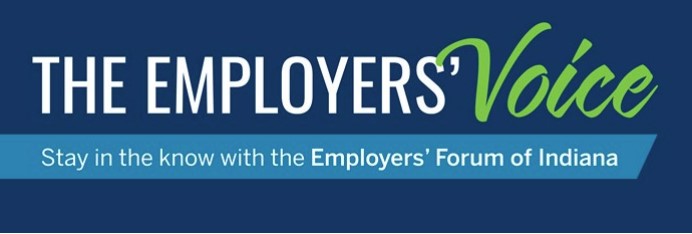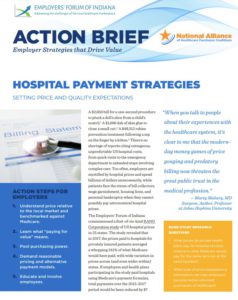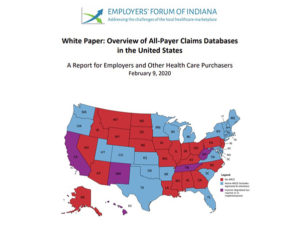
Welcome from the CEO
Welcome to this month’s issue of The Employers’ Voice, an e-newsletter for Employers’ Forum of Indiana members and participants.
In this issue we’ll share a snapshot of what the Forum has been up to; provide an update on our national conference; discuss transparency and value efforts that have been made on the state and national level; and give you the opportunity to learn more about one of our Forum members. We invite you to send resources and news of interest as the purpose of this newsletter is to provide a venue for sharing information among our diverse health care community.
Wishing you all a healthy and relaxing spring,
Gloria Sachdev
President and CEO, Employers’ Forum of Indiana
National Hospital Price Transparency Conference Postponed
Due to CDC recommendations announced on March 15, 2020, and with the health and safety of our members in mind, we have decided to postpone the National Hospital Price Transparency Conference, originally scheduled for May 12, 2020, in Indianapolis, Indiana. We will continue to monitor state, local, and national guidance regarding COVID-19 as we work to reschedule the event.
Updates will be communicated to Forum members as they become available, and will be posted to the Conference Website. For questions please contact us at meetings@employersforumindiana.org.
Forum Snapshot
Action Brief: Hospital Payment Strategies
The Forum, supported by a grant, funded the National Alliance for Healthcare Purchasers Coalition to develop an Action Brief.
Certificate Program on Addiction/Substance Use Disorder with an Opioid Specialization
In partnership with Purdue University College of Pharmacy, and with funding through the Employer’s Forum of Indiana, Overdose Lifeline has developed healthcare clinician and layperson continuing education online courses and 20-hour certificate program on Addiction / Substance Use Disorder with an Opioid Specialization. Designed for people with demanding schedules, the online courses may be taken from anywhere, completed when convenient to one’s schedule. Courses run 1.5 to 3 hours. Continuing education credit and a certificate will be delivered upon successful course completion.
Accreditation: Nursing (ANCC), Pharmacy (ACPE), Physician (ACCME) and AMA PRA Category 1 which will service all other clinical and layperson CEs.
For more information on the program visit learning.overdoselifeline.org.
White Paper: Overview of All-Payer Claims Databases in the United States
The number and transparency of All Payer Claims Databases, APCDs, has been increasing in recent years, signaling that states hope that purchasers of health care will use such a tool to allow them to shop for healthcare services in a more rational manner. The aim of these databases is to increase transparency in health care with the goal of creating a resource that can be used to reduce health care costs for purchasers, improve the quality provided to patients, improve overall efficiencies, and provide a foundation for market-driven strategies to move forward.
Our review, completed in the Fall of 2019, revealed that APCDs are primarily used to inform public policy and provide public health trends, and that having an APCD does not result in lower hospital prices. Read the White Paper
Policy Update
Health Care Bills to Offer Transparency
Leaders of the Indiana General Assembly and Gov. Eric Holcomb have made addressing high health care costs a top priority this year. Numerous bills were filed on January 6th and as of Feb 28th, much of the bill language is still alive and consolidated into a few key bills. The Forum joined Hoosiers for Affordable Health Care to address health care affordability for employers and Hoosiers. The following health care bills are hoping to cross the finish line, which is tentatively set for March 11th:
With the exception of site of service, most of the other bill language offer price transparency. Transparency is a great step towards creating a functional free market. Read the full article (Indiana Business Journal)
Member Spotlight
Meet Denise Murphy

Job Title: Director of Benefits and Compensation, University of Notre Dame
Years as an Employers’ Forum Member: One
Why did you choose to become a member of the Forum?
Last August, Christan Royer invited us to attend the August Employer Forum as guests to learn about the forum and member organizations. Immediately, we were interested in the information about hospital pricing and all data through the RAND study; especially the fact that Indiana pays significantly higher than Medicare. There was also a multi-stakeholder panel which provided a helpful overview / discussion from employers of their challenges and successes. We concluded that the Forum is a collaborative group of employers partnering to address the high cost of healthcare in the state as well as to improve the overall access to quality healthcare services. We are now members and participated in RAND 3.0.
If you could add or take away an aspect of the healthcare system, what would it be?
In many ways, it feels that the lack of transparency inherent in the PBM business model poses some of the greatest challenges to today’s medical plans. This is most easily seen in rebates only being reported to plans in aggregate, thereby removing the ability to accurately audit formulary cost-effectiveness. In addition, constant changes to MAC pricing and the careful renaming of payments from manufacturer to PBM that help them bypass a full pass through of rebates to plans cause distrust in the process and limits employers’ ability to ever see a full picture of where additional savings may be realized.
If you could travel anywhere in the world, where would you go?
I would go to Scotland! During the past year, I have been reading much about the history of Scotland and would love the opportunity to visit the country and meet the wonderful people.
Pharmacy Innovation
Sick of High Drug Prices, Insurers Join Hospitals to Make their Own Generic Medications

and/or shipped to help secure the supply of
quality generic medicines at fair prices.
Source: https://civicarx.org/
Everyone complains about high drug prices. But hospitals — and now insurers — are trying to lower costs by manufacturing their own generic medications. A consortium of seven hospital systems and three philanthropies came together to found Civica Rx in the fall of 2018. The non-profit venture works with generic drug companies to manufacture medications that are in short supply or subject to price spikes. Read the full article.
In the News
Employers
Every American family basically pays an $8,000 ‘poll tax’ under the U.S. health system, top economists say (The Washington Post)
America’s sky-high health-care costs are so far above what people pay in other countries that they are the equivalent of a hefty tax, Princeton University economists Anne Case and Angus Deaton say.
How state groups are working to lower healthcare prices (Modern Healthcare – Subscription Required)
A RAND report on hospital pricing last May pushed many employer purchasing groups into action.
Self-insured employers go looking for value-based deals (Modern Healthcare – Subscription Required)
A growing number of self-insured employer groups are pushing to transform how healthcare is priced, steering their employees to high-value providers and negotiating prices as a percentage of Medicare payment rates.
U-Haul will stop hiring smokers, to foster ‘a culture of wellness’ — and cut health-care costs (The Washington Post)
U-Haul is pumping the brakes on hiring nicotine users in 21 states beginning Feb. 1. The moving-equipment and storage-unit rental company announced Monday that it will implement its nicotine-free policy in states that don’t have protections for smokers’ rights.
Hospitals
Hospitals Merged. Quality Didn’t Improve. (The Wall Street Journal)
The quality of care at hospitals acquired during a recent wave of deal making got worse or stayed the same, new research found.
Hospitals Aren’t Meeting Their Own Modest Cost-Cutting Goals (Bloomberg Law)
Hospitals, which are responsible for the biggest share of U.S. health-care spending, are beginning to wake up to the reality that they need to reduce their costs. But few have met even their own modest goals for doing that.
Trump Administration Announces Historic Price Transparency Requirements to Increase Competition and Lower Healthcare Costs for All Americans (HHS.gov)
Two regulations advance the Trump Administration’s commitment to increasing price transparency.
The 407 hospitals with 5 stars from CMS (Becker’s Hospital Review)
CMS updated its Overall Hospital Quality Star Ratings for 2020, giving 407 hospitals a rating of five stars. CMS’ assigned star ratings to more than 4,500 hospitals nationwide based on their performance across seven areas of quality.
Pharmacy
How Drug Prices Work(The Wall Street Journal)
Drug pricing is complicated and secretive. WSJ explains how the flow of money, drugs and rebates behind the scenes may drive up the price of prescription medicine for consumers.
Medicinal Uses of Cannabis-Derived Products (National Alliance of Healthcare Purchaser Coalitions)
This clinical brief provides an overview of the legal status of cannabis in the United States, the Food and Drug Administration’s (FDA) approved uses for cannabis-derived products in medical treatment, as well as employer workplace policy considerations regarding non-FDA approved cannabis-derived products that may be available.
Public Health
Gasping for Care: Home nursing shortage impacts most vulnerable Hoosiers (WTHR)
For many medically-fragile Hoosiers, home healthcare is difficult – sometimes impossible – due to a chronic shortage of home nurses. A WTHR investigation finds Indiana’s home nursing shortage impacts thousands of the state’s most vulnerable residents, often with dire consequences.
Do you have a suggestion or contribution for our next newsletter? Contact us.



